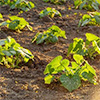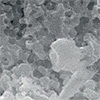Sep 21, 2023 (Nanowerk News) It sounds like magic: photoelectrodes could convert the greenhouse gas CO2 back into methanol or N2 molecules into valuable fertiliser - using only the energy of sunlight. An HZB study (Small Methods, "Surface-mediated charge transfer of photogenerated carriers in diamond") has now shown that diamond...
Advancing targeted delivery with uniformly prepared nanocapsules
Sep 21, 2023 (Nanowerk News) In a new study (Chemical Science, "Nanocapsules of unprecedented internal volume seamed by calcium ions"), researchers at the University of Missouri created a proof of concept of a nanocapsule — a microscopic container — capable of delivering a specific “payload” to a targeted location. While...
Nanoparticles made from plant viruses could be farmers’ new ally in pest control
Sep 21, 2023 (Nanowerk News) A new form of agricultural pest control could one day take root—one that treats crop infestations deep under the ground in a targeted manner with less pesticide. Engineers at the University of California San Diego have developed nanoparticles, fashioned from plant viruses, that can deliver...
Researchers develop first method to study microRNA activity in single cells
Sep 21, 2023 (Nanowerk News) MicroRNAs are small molecules that regulate gene activity by binding to and destroying RNAs produced by the genes. More than 60% of all human genes are estimated to be regulated by microRNAs, therefore it is not surprising that these small molecules are involved in many...
Innovative solution for poultry litter waste management using photocatalytic titanate nanofibers
Sep 21, 2023 (Nanowerk News) The shift away from using poultry litter for crop fertilization has transformed this once-valuable agricultural byproduct into an environmental liability for poultry producers. Addressing this challenge, a study led by Dr. Jun Zhu from the University of Arkansas offers an innovative approach using photocatalytic titanate...
New nanopore tech for quicker, more thorough mRNA quality checks
Sep 21, 2023 (Nanowerk News) Researchers at The University of Queensland are harnessing the latest sequencing technology developed by UK-based biotech Oxford Nanopore Technologies to analyse mRNA vaccines and therapies. This approach promises to simplify and better ensure the quality of manufactured mRNA-based vaccines and therapeutics worldwide. The BASE team...
MXene-enhanced hydrogel sensors for wearable technologies and human-machine interfaces
Sep 21, 2023 (Nanowerk Spotlight) Hydrogel materials show great promise for developing next-generation wearable sensors due to their flexibility, biocompatibility and tunable electrical properties. However, it remains challenging for hydrogel sensors to achieve high sensitivity while maintaining robust mechanical stretchability and stability in changing environments. Now, scientists from multiple Chinese...
New method makes microcombs ten times more efficient
Sep 20, 2023 (Nanowerk News) Microcombs can help us discover planets outside our solar system and track new diseases in our bodies. But current microcombs are inefficient and unable to reach their full potential. Now, researchers at Chalmers University of Technology in Sweden have scored a world first with their...
New graphene coated silicon photocatalyst enables efficient solar-driven hydrogen production and biomass refinery
Sep 20, 2023 (Nanowerk News) A team of researchers, led by Professor Jungki Ryu in the School of Energy and Chemical Engineering at UNIST and Professor Soojin Park from Pohang University of Science and Technology (POSTECH), have achieved a significant breakthrough in the development of a hybrid silicon photocatalyst. This...
Black holes eat faster than previously expected
Sep 20, 2023 (Nanowerk News) A new Northwestern University-led study is changing the way astrophysicists understand the eating habits of supermassive black holes. While previous researchers have hypothesized that black holes eat slowly, new simulations indicate that black holes scarf food much faster than conventional understanding suggests. The study will...










